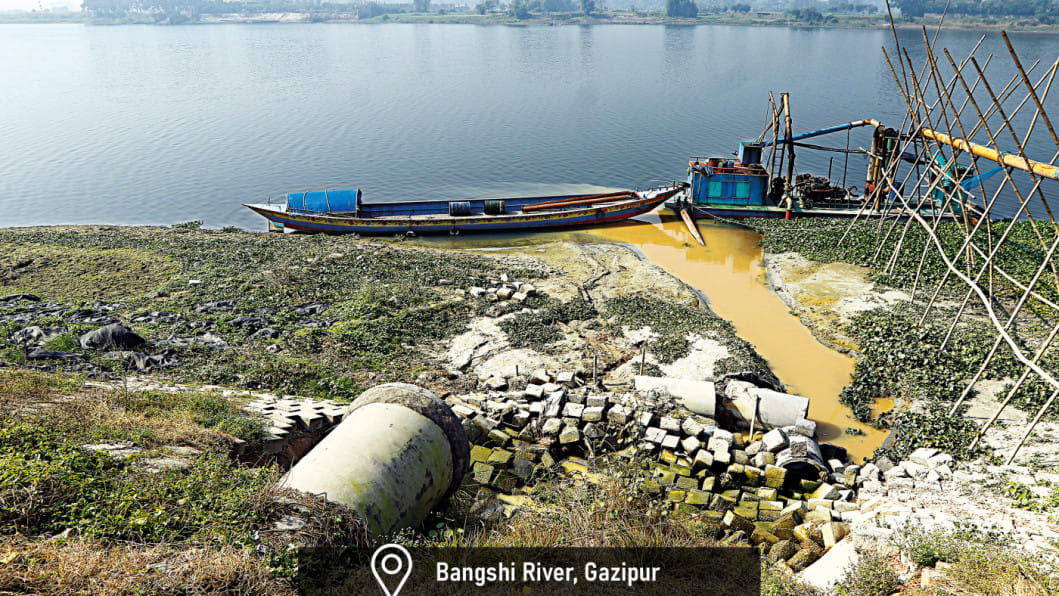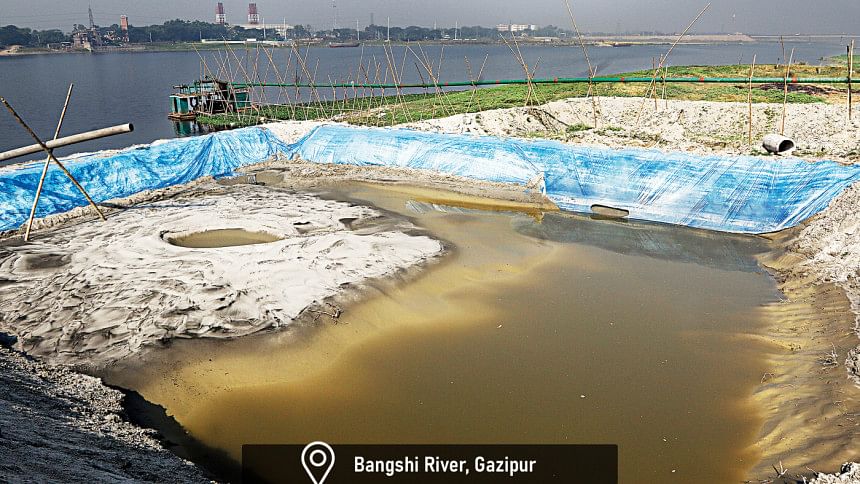Bangshi endangered

The Bangshi River was once an indispensable part of everyday life for the people of Nolam village in Savar on the outskirts of Dhaka.
But over the last twenty years, dumping of industrial waste has gradually turned the river into a source of misery for them.
The 238-kilometre stream in central Bangladesh served as a source of water for everyday use like irrigation and bathing. People even used to drink from it.
But now, they are unable to use the water for irrigation, as it damages the crops, like paddy and vegetables. Children are also warned against getting in the water for a dip for fear of developing skin rashes.
The despair of those living along the banks is worse as they have to endure the stench emitted by the filthy water for most parts of the year.
The Bangshi River originates in Jamalpur and flows through Tangail and meets the Tongi in Gazipur. It passes near National Memorial in Savar and falls into the Dhaleshwari.
Sholu Mia, 75, has seen the best and the worst of Bangshi. The senior citizen of Nolam village said, “The river was famous for fish, but there are no fishes now. The once pristine water is now being polluted by the liquid waste released by factories nearby, including Dhaka Export Processing Zone.”
“It has been going on for long and no steps have been taken in this regard,” he told The Daily Star recently.
It becomes impossible to breathe for the stench during the dry season; besides, it has become a breeding ground for mosquitoes and other insects, he added.
Sholu Mia said farmers in the vicinity complain that paddy cultivation has reduced drastically as a result of using water from this river for irrigation.
Talking to The Daily Star, Saidur Rahman, a university student and a resident of the same village, said several factories from Dhaka Export Processing Zone (DEPZ) and other factories, particularly the textile washing factories in Ashulia, discharge contaminated liquid waste into a waterbody behind the DEPZ. The contaminated water then mixes with Bangshi River through a canal, he added.
He claimed that although the factories have Central Effluent Treatment Plant (CETP), factory authorities do not properly treat the waste before discharging it in the waterbody.
Visiting the Nolam area recently, this correspondent found land owners along the Bangshi River selling their soil off to brick kilns, as the lands are rendered useless for low crop yield. The stench from the water also holds them back from setting up small businesses or homes, as people avoid the area.
Locals said the water quality in upstream Bangshi is good, but it starts dropping at Shimulia union, at the start of the industrial belt, including DEPZ.

Contacted, Abdus Sobhan, general manager of DEPZ, said the export processing zone has a central CETP, while eight factories inside the DEPZ have their own separate CETP as well.
“We discharge the liquid waste after proper treatment, under the Environment Act 1997.”
When asked about the blackish colour of the discharged water, Abdus Sobhan argued that the colour of the water does not mean that it is polluted. “It would be better if you visit our CETPs.”
Begum Rubina Ferdousi, director (monitoring and enforcement) at Department of Environment (DoE), said: “How would I say who is polluting the river? If anyone complains to us, we will look into the matter and take proper steps.”
Rubina said the DoE officials of Dhaka division are better equipped to provide details on whether the washing factories in Savar have environmental certificates to operate or not.
Saiful Islam, chairman of Swanirvar Dhamsona Union Parishad in Savar, said, “After being elected as chairman, I submitted a written compliant to DEPZ authorities regarding the factories in the economic zone that are releasing liquid waste, which are polluting the Bangshi river, cannels and adjacent agriculture lands.”
“In response, they said they were not responsible for the pollution; rather, it may be the other factories outside the DEPZ that were doing so.”
Syeda Rizwana Hasan, chief executive of Bangladesh Environmental Lawyers Association (Bela) told The Daily Star that the chairman contacted them regarding pollution at the Bangshi River.
“Although there is no research on the river, our observations show the intensity of the pollution. There is no water flowing in the river, only industrial waste.”
“We wanted to do a public hearing on the matter, but we were unable to do so as there was no further communication from the chairman,” she added.
Shamsul Haqe, secretary of Savar Nodi O Poribesh Unnayon Parishad, said, “We spoke to several authorities, including National River Protection Commission, DoE, local administration and BELA over Bangshi river grabbing and pollution.”
Although a list of Bangshi grabbers was prepared by the local administration, a list of the polluters is yet to be prepared, he added.
The negligence of DoE officials is the reason for pollution of the river, said Shamsul.
A top-level official of DoE Dhaka District told The Daily Star yesterday that they have monitoring points at some rivers in Dhaka, but none at the Bangshi River.
“If DG sir asks us to bring this under our monitoring, then we will do so,” said the official seeking anonymity.

 For all latest news, follow The Daily Star's Google News channel.
For all latest news, follow The Daily Star's Google News channel. 



Comments